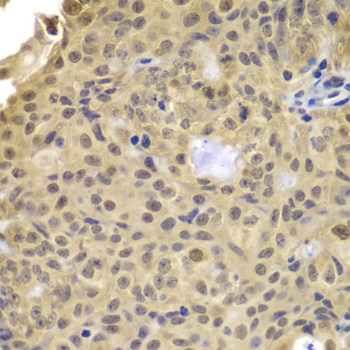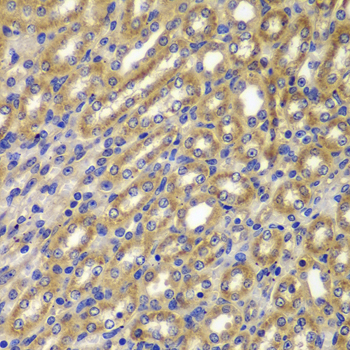Product Detail
Product NameCyclin A2 Rabbit Polyclonal Antibody
Host SpeciesRabbit
ClonalityPolyclonal
IsotypeIgG
PurificationAffinity purification
ApplicationsWB,IHC,IF
Species ReactivityHuman,Mouse,Rat
Immunogen DescA synthetic peptide of human Cyclin A2
ConjugateUnconjugated
Other NamesCCN1;CCNA;Cyclin A2;CCNA2;cyclin-A2
Accession NoSwiss Prot:P20248
GeneID:890
Uniprot
P20248
Calculated MW48kDa
Sdspage MW55kDa
FormulationBuffer: PBS with 0.02% sodium azide,50% glycerol,pH7.3.
StorageStore at -20˚C. Avoid freeze / thaw cycles.
Application Details
WB 1:500 - 1:2000
IHC 1:50 - 1:200
IF 1:50 - 1:200
Immunohistochemistry of paraffin-embedded human well-differentiated squamous skin carcinoma using Cyclin A2 at dilution of 1:100 (40x lens).
Immunohistochemistry of paraffin-embedded mouse kidney using Cyclin A2 at dilution of 1:100 (40x lens).
Immunofluorescence analysis of U2OS cells using Cyclin A2 at dilution of 1:100. Blue: DAPI for nuclear staining.
Western blot analysis of extracts of various cell lines, using Cyclin A2 at 1:1000 dilution._Secondary antibody: HRP Goat Anti-Rabbit IgG (H+L) at 1:10000 dilution._Lysates/proteins: 25ug per lane._Blocking buffer: 3% nonfat dry milk in TBST._Detection: ECL Enhanced Kit (RM00021)._Exposure time: 90s.
The protein encoded by this gene belongs to the highly conserved cyclin family, whose members are characterized by a dramatic periodicity in protein abundance through the cell cycle. Cyclins function as regulators of CDK kinases. Different cyclins exhibit distinct expression and degradation patterns which contribute to the temporal coordination of each mitotic event. In contrast to cyclin A1, which is present only in germ cells, this cyclin is expressed in all tissues tested. This cyclin binds and activates CDC2 or CDK2 kinases, and thus promotes both cell cycle G1/S and G2/M transitions.
If you have published an article using product 55266, please notify us so that we can cite your literature.
et al,CD155 Cooperates with PD-1/PD-L1 to Promote Proliferation of Esophageal Squamous Cancer Cells via PI3K/Akt and MAPK Signaling Pathways. In Cancers (Basel) on 2022 Nov 15 by Xiyang Tan, Jie Yang, et al..PMID:36428703
, (2022),
PMID:
36428703






 Yes
Yes



